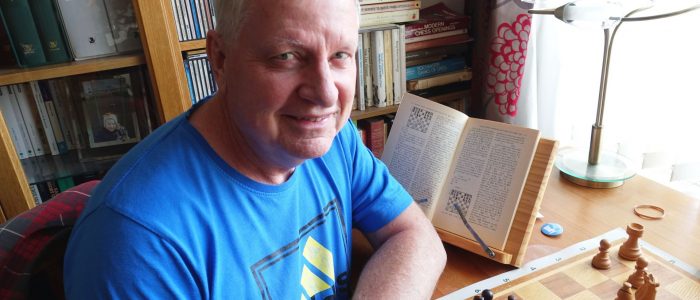Forth Valley Corneal Transplant Recipient Backs World Sight Day
A man who described his vision being like a paracetamol dissolved in water before a life-changing cornea transplant this year has shared his gratitude on World Sight Day (10 October 2019).
Avid reader David Fowler, 67, from Bonnybridge, feared he wouldn’t be able to read books, drive or see his grandchildren grow up after being diagnosed with a progressive eye disease, discovered after a visit to his optician over fifteen years ago.
Following continual monitoring, David’s first successful corneal graft took place in 2017 at the Queen Margaret Hospital in Dunfermline, with a second corneal transplant on his left eye going ahead at the Forth Valley Royal Hospital in June 2019.
David has spoken of how the surgery has transformed his life to encourage people to think about tissue donation, and make their decision known.
In 2018/19, there were 331 cornea transplants in Scotland, with the surgery made possible thanks to the generosity of deceased donors and their families.
However with the number of cornea donations in Scotland falling by 29 per cent compared to the previous year, the importance of the potentially sight saving surgery has been highlighted.
From Autumn 2020, the law around organ and tissue donation is changing in Scotland, meaning that if people have not confirmed whether they want to be an organ donor, it may be assumed they’re willing to donate when they die.
People have a choice, and they can record their decision on the NHS Organ Donor Register at any time.
Currently, 11.6 per cent of people from Scotland on the NHS Organ Donor Register have expressed their decision not to donate their corneas. Of those donors who have indicated which organs and tissue they were not prepared to donate, 58 per cent said corneas.
David, whose vision was affected by a condition called Fuchs Corneal Endothelial Dystrophy, said:
“My vision was getting poor, everything was fuzzy. It was getting to the stage where I couldn’t drive at night, particularly in winter when there was glare due to rain. Reading is one of my biggest delights in life and I was at the stage where I couldn’t read the introduction to a novel if it was printed in italic. The computer became a problem too.
“The corneal graft has simply been life changing. As far as my vision is concerned the colours are much more vivid. Before it was like dissolving a paracetamol in a glass of water, cloudy. Now everything is sharp and the definition is brilliant,
“I’m very grateful to the tissue donors and their families. Sadly I can’t express my thanks to the people kind enough to donate, but because of their decision, I’m able to drive, I can read, and will be able to see my ten grandchildren grow up.”
NHS Forth Valley, where David’s second surgery took place, has introduced an innovative scheme to increase the rate of tissue donation from the Emergency Department at the Forth Valley Royal Hospital.
Staff carrying a prompt card on the process of approaching family members and the criteria for tissue donation has led to cornea donation doubling in the NHS board over the past year.
Dr Sharon Zahra, Tissue and Cells Consultant & Clinical Lead, Scottish National Blood Transfusion Service said:
“Tissue and organ donations are essential to many operations that are available for NHS patients in Scotland; however none of these operations would be possible without the very generous donation made by donors at the time of their death. We thank all donors and their loved ones for allowing donation to go ahead so that other patients’ lives may be saved or greatly improved.”
People can find out more about the opt out system of organ and tissue donation, and their choices at organdonationscotland.org





